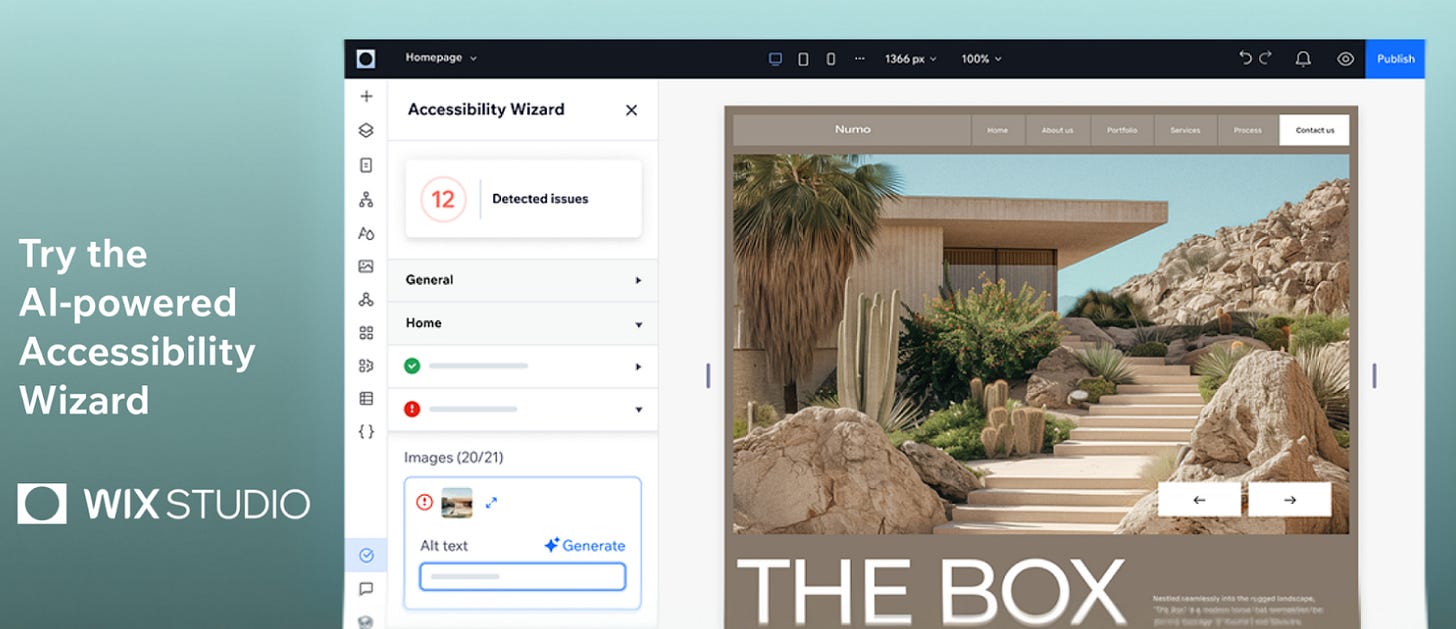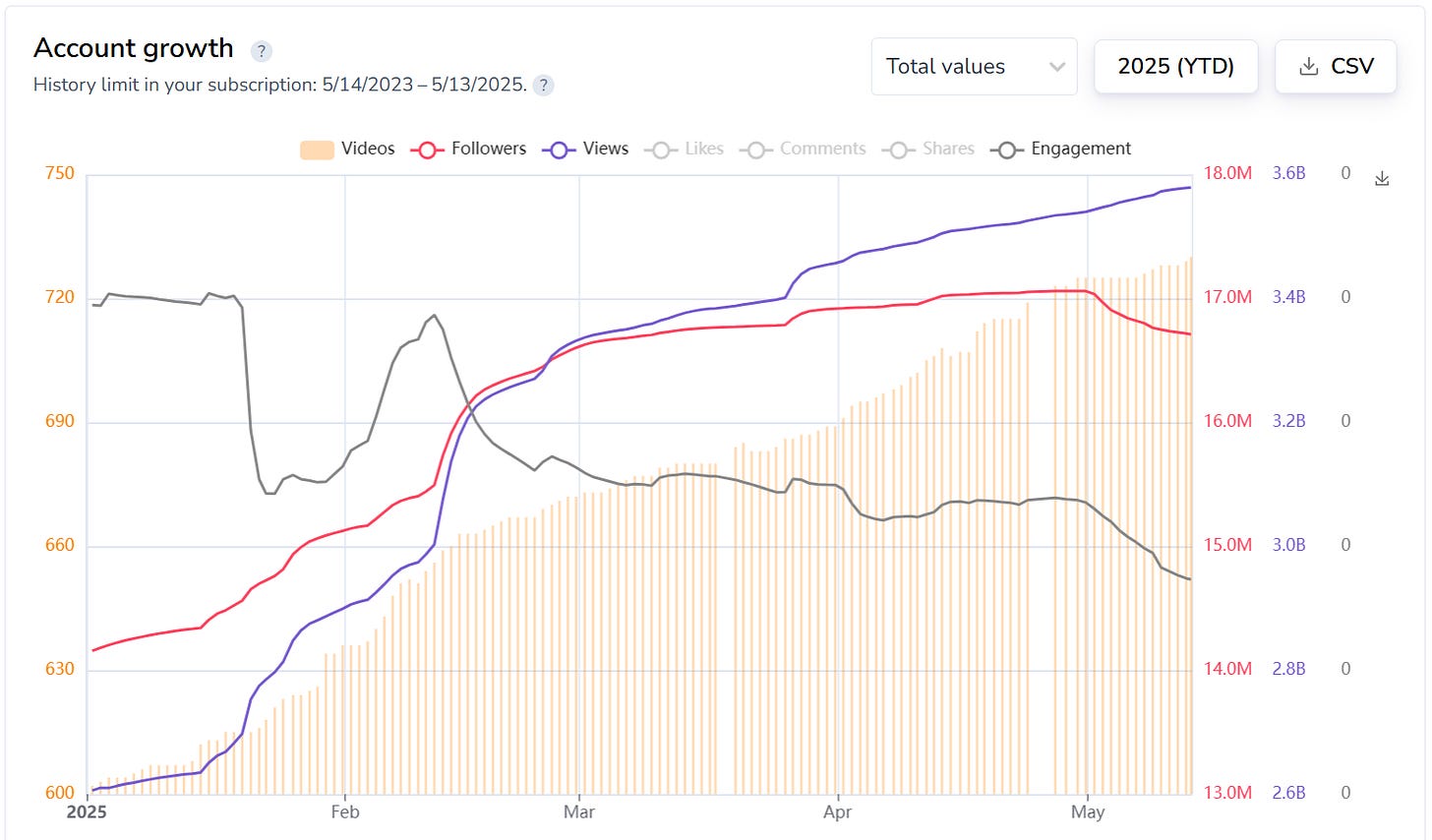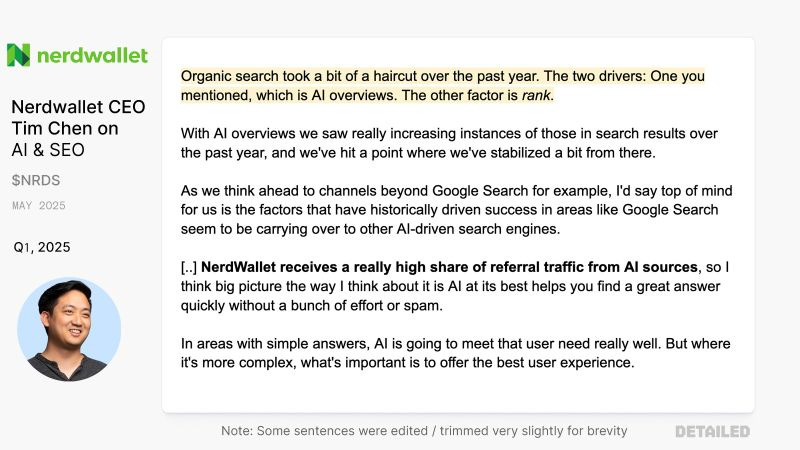Google Isn’t The Only Path To Organic Growth
Your SEO (search everywhere optimization) strategy should work beyond the search bar. I share 6 brands that aren't solely reliant on Google.
This week's #SEOForLunch is sponsored by Wix StudioNote: this email has quite a few images and may cause this email to be truncated
Please click this link to make sure you can view the entire rant newsletter.
A few weeks back, Google held its annual I/O conference, where it announced updates on the company's focus, products, and things to look forward to in the coming months/years.
No SEO was surprised to hear Google repeatedly say how successful AIOs and all its AI endeavors are. It’s unfortunate, but it’s clear that click-stealing efforts are here for good, or at least not going away anytime soon.
Queue migraines for all SEOs
This week’s #SEOForLunch is sponsored by Wix Studio.
AI-powered alt text is here with the Wix Studio Accessibility Wizard
Now you can use AI to generate bulk alt text for images with the Wix Studio Accessibility Wizard.
Here’s what you can do:
Scan your site with one click - directly from the editor panel
Detect and fix issues like color contrast and heading structure
Keep track of what’s been fixed and manage resolved items effortlessly
Manually manage and edit images’ alt text and now with AI
Learn more about accessibility and generating Alt Text with AI on Wix Studio
It’s NOT The End Of The World (As We Know It)
When most people think “SEO,” they think “search,” which defaults to Google. Lately a new definition has been coined. SEO = Search EVERYWHERE Optimization.
If you're still building a strategy that hinges solely on traditional search rankings, you're playing a rigged game. I already addressed the issue in a previous #SEOForLunch post on why attribution screws the organic channel.
This week, I want to take it further. Because if SEO is going to survive, it needs to evolve beyond just Google.
Let’s talk about the organic plays some of the top brands are investing in. These are the ones that don’t rely on a single search engine and is likely the future “levers” SEOs will need to lean on to justify their value.
6 Google Alternatives (+Google)
The good news?
Smart brands are already diversifying. They are building visibility where their audience actually spends time, not just where they search.
Below are 6 Google alternatives where brands are capturing customers attention and still very much getting value from their organic visibility.
If anyone is panicking we’re not talking about organic search, feel better knowing Google is still listed at the bottom.
1. AI / LLMs (ChatGPT, Perplexity, Gemini, etc.) — Zapier
Zapier is leading the charge in a future where AI tools and prompt ecosystems aren’t just optional but mandatory for staying visible. They’ve thrown serious resources behind optimizing for ChatGPT, Perplexity, Gemini, and more.
Why? Because the writing’s on the wall. These platforms aren’t just novelty chatbots talking about putting glue on pizza anymore, they’re becoming essential parts of how users discover, interact with, and integrate information. Think of them as the new front page of search, the place where your audience’s questions are answered.
AI has become the first legitimate competitor to Google. Users are now able to get the information they seek without ever touching Google.
Here’s a glimpse at how it’s playing out for early adopters like Zapier:
Similar Web AI Chatbot Traffic Estimates
Semrush traffic from AI Overview listings within Google Search
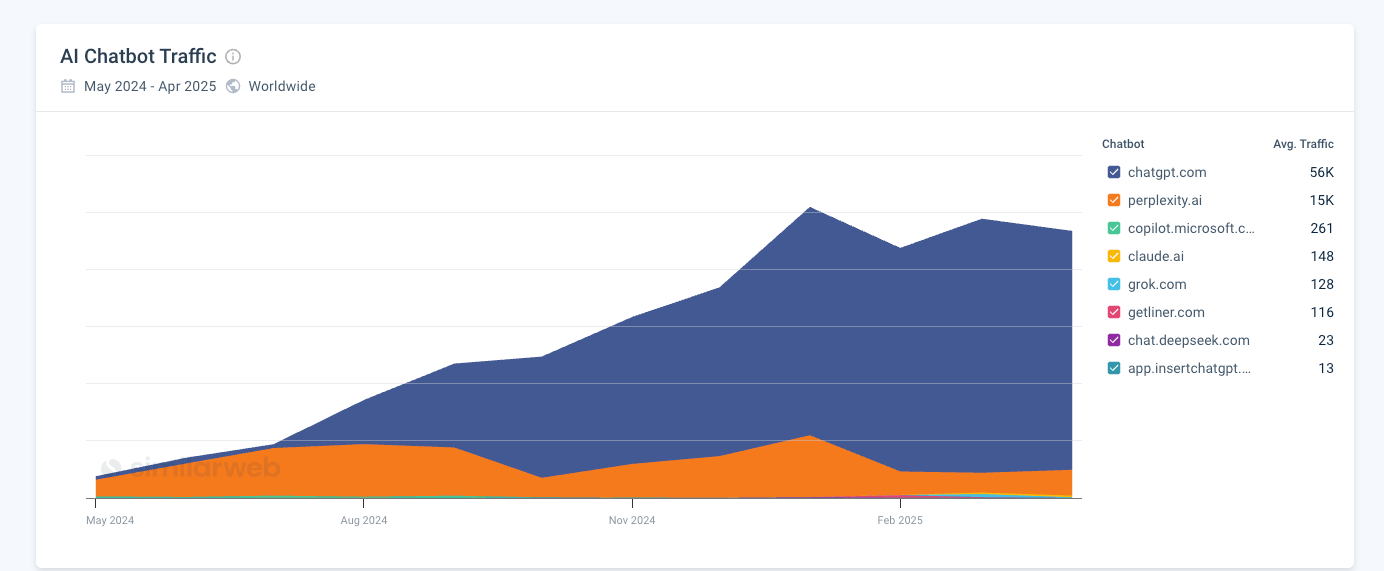

The charts speak for themselves: significant traffic from AI chatbot interfaces, rising engagement in Perplexity and Gemini, and a growing slice of direct and organic traffic tied to prompt-optimized content.
What makes this model so compelling?
AI-driven platforms like ChatGPT, Perplexity, and Gemini aren’t just a trendy experiment, they are actively changing how people find information. Unlike traditional search where you chase rankings, these systems place your content front-and-center in response to direct user prompts. Zapier is ahead of the curve, investing in optimized content that AI chatbots love to surface, giving them a head start in the new digital frontier. This isn’t just optimization; it’s a proactive play to own visibility where your audience is already engaging.
This shouldn’t be viewed as a side hustle for SEOs. It’s the start of a seismic shift in how brands will drive organic visibility and capture demand.
SEO isn’t dying but the shift to “search EVERYWHERE optimization” has already begun. Have you embraced it yet or are you still hoping Google removes AIOs one of these days in the near future?
2. YouTube — Ahrefs
Ahrefs is a textbook case of how to own an organic channel outside of Google. They’ve leveraged YouTube’s evergreen, educational content format to not just build brand, but also generate demand where it matters most, at the bottom of the funnel. And guess what? Google’s algorithms/stock holders/AI etc. won’t impact this visibility (well, not yet).
What makes this model so compelling?
Consistent viewership: Monthly traffic estimates show steady growth, even amid algorithm changes. This isn’t just about one-off viral hits; it’s about sustained visibility and connecting with their audience — beyond the Google SERP.
Targeted content: Ahrefs delivers high-value, educational SEO videos. This is content that builds trust and positions them as an authority in the space.
Brand-led demand capture: Video viewers aren’t just passive watchers—they’re entering Ahrefs’ sales funnel, bypassing Google SERPs entirely.
The Socialblade stats make it crystal clear:
Over 29 million total views
Consistent new subscribers every month
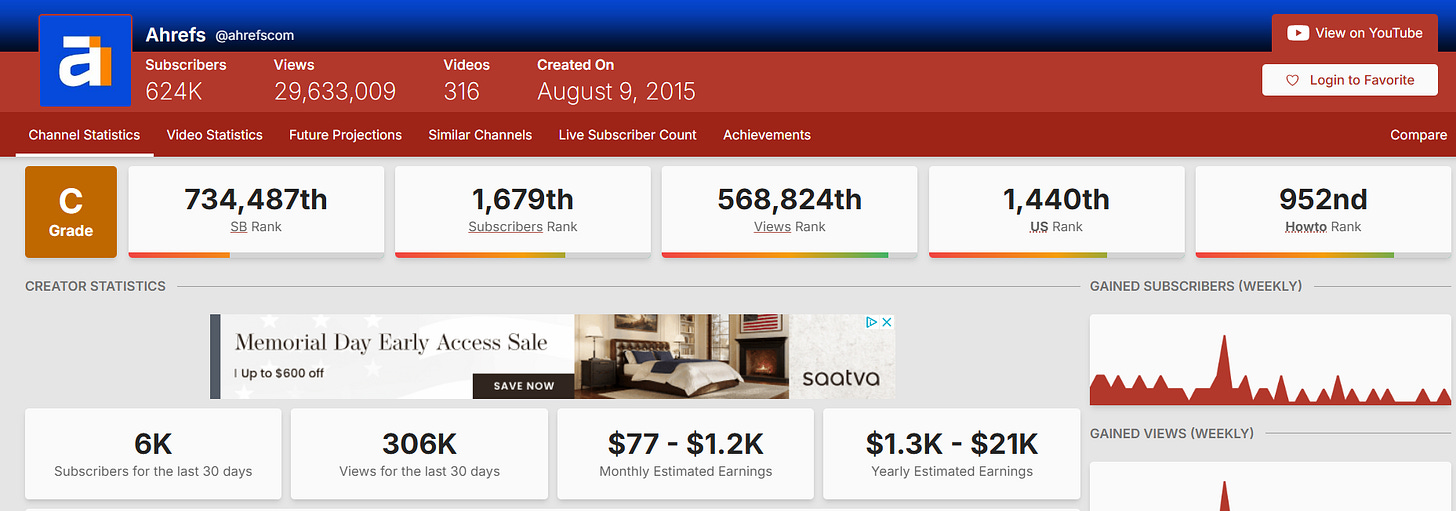
This isn’t a side project for the Ahrefs team. It’s become an integral channel for driving both awareness and conversions. Ahrefs’ approach showcases a strategic shift: build your audience where they’re already consuming content, and don’t leave it to chance.
In an era where Google’s search interface is evolving fast (hello AI Overviews 👋), YouTube gives brands control over their message, their audience, and their outcomes.
3. Podcasts — Hubspot
HubSpot isn’t just playing the content game. It’s owning the narrative through its network of podcasts. With shows like "Content Is Profit" and others, they’re transforming listeners into loyal fans, leads, and eventually, customers.
What makes this model so compelling?
Long-Term Engagement: Podcasts are an investment in relationships. Unlike your daily search clicks, a loyal podcast listener tunes in weekly, sometimes multiple times… for YEARS.
Global Reach with Localized Appeal: ListenNotes data shows that while ~69% of listeners are US-based, HubSpot’s content resonates across markets ranging from Canada and India to Australia and the UK. Sounds like a big win to me!
Evergreen Content That Works: Podcast episodes don’t “expire.” A great interview or topic from a year ago can still pull in listeners today, building trust over time.
Here’s a snapshot of HubSpot’s podcast dominance:
Top 1.5% global rank on ListenNotes
Multiple shows across formats (interviews, panel discussions, solo episodes)
Consistent audience growth driven by word of mouth and distribution across Spotify, Apple, and Google Podcasts

This isn’t just a brand play but a powerful organic channel that doesn’t get love from SEOs. HubSpot is effectively bypassing Google, turning “subscribers” into “superfans,” and creating a content ecosystem that doesn’t hinge on search engine rankings.
If your brand isn’t considering a podcast as part of its organic strategy, it’s time to rethink what organic really means.
Hell, I mean, If I can do it, you and your company certainly can!
4. Communities — SEO Community / WTS Community
From Women in Tech SEO to indie Slack groups, organic visibility now happens through people talking about you, not just linking to you.
Noah Learner’s SEO Slack Community has over 4,00 members… and Areej AbuAli’s Women in Tech SEO Slack group has over 10,000 members!
When I reached out to Areej and her WTS partner, Erin Simmons, they shared this with me.
Communities like WTS give you something Google just can’t when answering questions for your audience—real trust, relationship continuity, & deeper context.
The trust you gain from showing up for people compounds over time. You’re not just answering a question—you’re becoming part of someone’s support system.
These spaces are built for ongoing relationships. The value you provide doesn’t disappear with the next algorithm update. It sticks—because people remember who shows up for them.
Answering 1:1 questions is also going to be much more context rich - you get a deeper understanding of where people are coming from, the ability to ask clarifying questions, and can offer thoughtful answers with detail that you may not be able to share in a more public-facing way.
-Erin Simmons, Managing Director, Women in Tech SEO
What makes this model so compelling?
Communities foster genuine connection, deeper trust, and create long-term stickiness that search engines alone can’t replicate. When you’re part of someone’s trusted network, you’re front-of-mind—and that loyalty translates into repeat traffic, brand advocacy, and organic growth without relying solely on Google.
Privatized communities aren’t exclusive to the digital marketing scene either. Below is a screenshot of corral.net, a popular message board for Ford Mustang enthusiasts. 200k+ members with nearly 10 MILLION posts.
This reminds me a lot of pre-social media / early internet days. Could we see a Renaissance in good ol’ passion-driven communities!?
With the future of the internet likely going dark, I think this is the future.
5. Social Media — Duolingo (tiktok)
Duolingo turned social media, specifically TikTok into a brand engine. It’s organic. It’s intentional. And it works because they built native content people want to engage with.

What makes this model so compelling?
Duolingo mastered platform-native content. They are playful, engaging, and perfectly matched to TikTok’s audience expectations. They aren’t trying to port search strategies into social; they’re leaning into authentic storytelling, which builds massive visibility and organic discovery without depending on Google.
The key takeaway? Organic growth isn’t just about on-page best practices and publishing content to target a keyword. It’s about how and where you show up, using the rules of the platform itself.
6. Reddit — Notion
Notion has mastered the art of earning Reddit love without looking spammy. This is modern-day SEO empathy, timing, and participation.
Selfishly, I love Reddit. The community rewards authenticity and burns overly promotional brands to the ground. They even have a subreddit dedicated to commercials users hate.
Reddit is a powerful platform but one you must be very careful with.
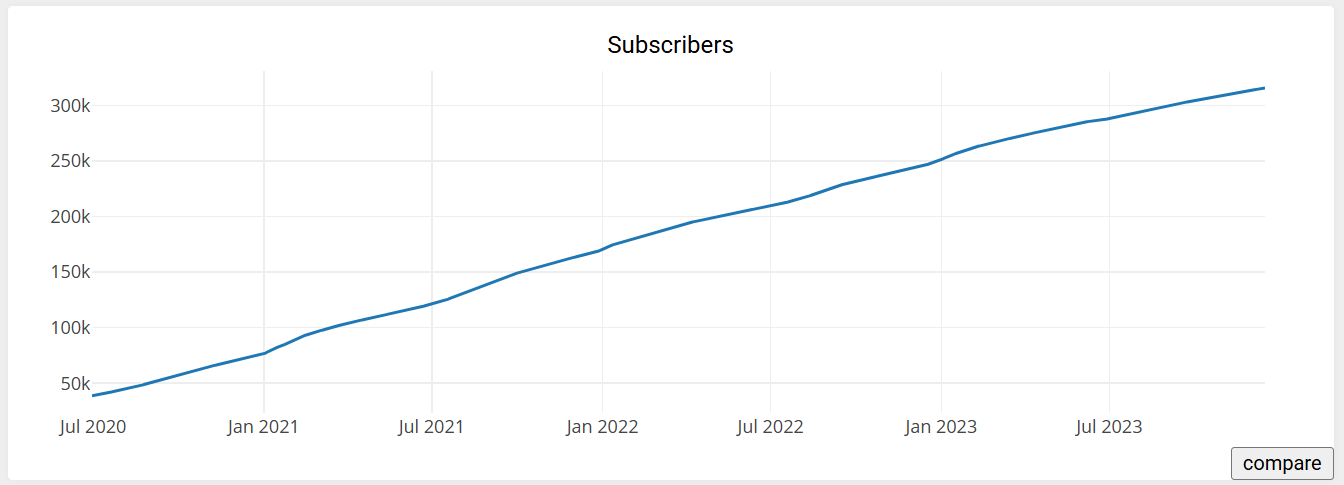
What makes this model so compelling?
Notion’s community presence isn’t about pushing product. It’s about listening, sharing, and participating authentically. They’ve tapped into Reddit’s unique dynamic where brand visibility grows when you blend in with the culture instead of standing out with overt marketing.
It’s worth noting that while Subredditstats no longer offers up-to-date data (due to high Reddit API costs — don’t bring this up to redditors unless you want an earful).
This tool is still solid for getting directional insights into subreddit growth and engagement trends. The data above reflects legacy stats, but it’s a testament to Notion’s ability to build organic visibility through community love.
7. Last but not least. Search engines - Google, Bing — NerdWallet
Let’s not pretend search is dead (yet).
NerdWallet and others are still crushing it with traditional search. It’s important to now that they’ve built brands that rank, not just pages that match queries.
In fact, while NerdWallet’s overall organic traffic has seen significant gains in the past, its CEO Tim Chen recently acknowledged in a public earnings call that organic search has faced a downturn. This reinforces the importance of building resilient, diversified digital strategies that go beyond a single traffic source.
What makes this model so compelling?
While NerdWallet clearly benefits from Google’s traffic, what sets them apart is their ability to combine product value with a long-term brand presence. It’s not just about capturing queries, it’s about being the name users and search engines trust.
They’ve leaned into diversified organic strategies and grown a site where brand and search go hand in hand. While we may not like the changes Google’s AI is introducing, we can’t deny that for those who play the long game, search is still a vital part of the organic mix.
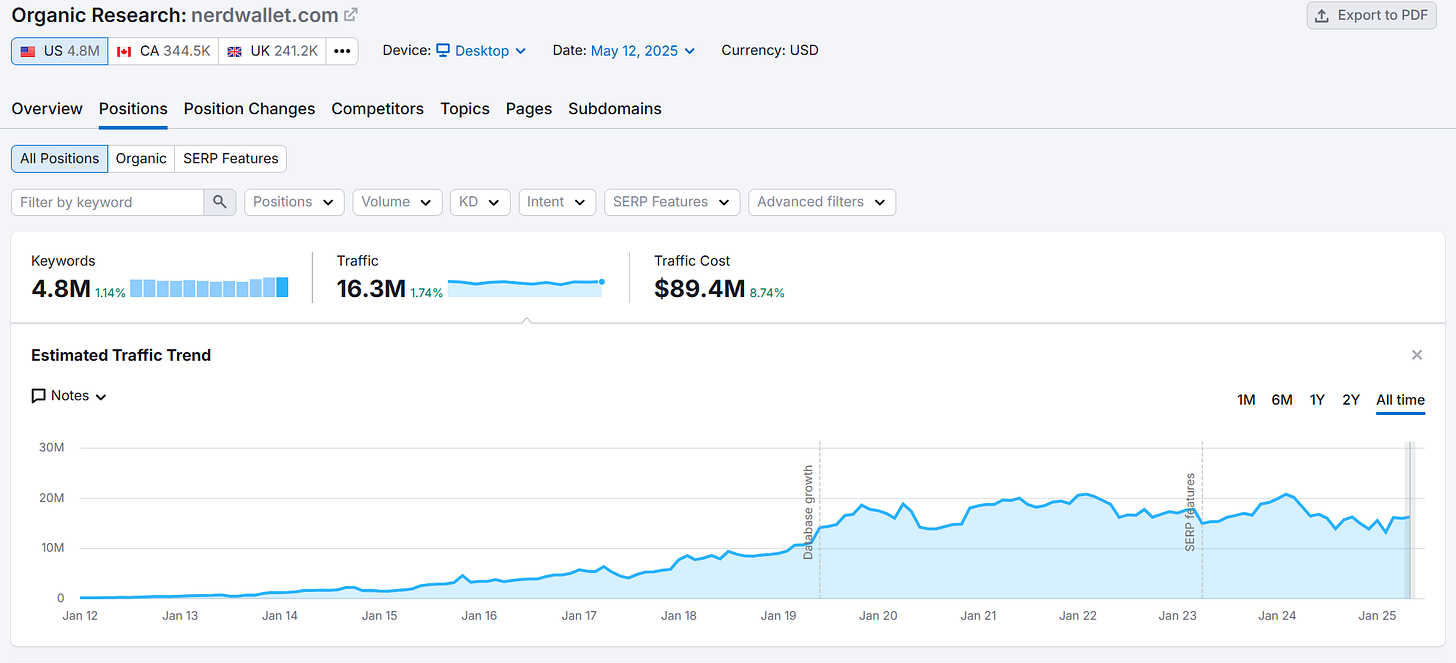
Bottom Line: Build a Search-Resilient Brand
If you’re still hitching your entire SEO strategy to Google’s wagon, you’re setting yourself up for disappointment. The world’s shifting. AI, social, communities, video, podcasts…these are the frontiers where smart brands are already planting their flags.
NerdWallet didn’t just build pages but a brand. Ahrefs didn’t just create content endless text content for Google, they created a top rated video resource. Zapier’s not fighting to post AIO scraps, they’re owning the next-gen answer engines.
This isn’t a “nice to have.” It’s survival.
So, the question isn’t “Should we diversify?” The real question is, “Why the hell haven’t we already?”


